We use cookies to personalize content, provide social media features and analyze traffic. You can get more information by visiting our cookie policy. You can configure cookies without accepting them by clicking hither.
These are the 12 best AI-CRM combinations for Salesforce in 2025:
- Salesforce + Harmonix AI
- Salesforce + Einstein AI
- Salesforce + Gong
- Salesforce + Drift
- Salesforce + Clari
- Salesforce + People.ai
- Salesforce + Exceed.ai
- Salesforce + Monday Sales CRM with AI
- Salesforce + SugarCRM with SugarPredict
- Salesforce + Nimble CRM with Social AI
- Salesforce + Creatio CRM with Studio AI
- Salesforce + Copper CRM with Smart Suggestions
Nowadays, many companies are wondering What is a CRM with artificial intelligence and why it has become a key tool for modern customer management.
The answer lies in how AI completely transforms the way sales and customer service teams work.
It's no longer just about storing contacts or recording activities, but about Automate tasks, anticipate customer needs and make decisions based on real data.
An AI-powered CRM allows Analyze conversations, detect behavioral patterns, generate personalized recommendations and, above all, save time on repetitive processes.
This translates into teams faster, more productive and with better results.
In addition, many companies continue to use a single communication channel, such as email or calls.
However, when data from all channels is unified, the strategic vision improves dramatically.
In this article, we'll see how a CRM with artificial intelligence works, what advantages it offers compared to traditional models, and how companies like Salesforce are implementing it.
We'll also explore what impact AI has on productivity and customer experience.
The 12 Best CRM-IA Combinations for Salesforce
1. Salesforce + Harmonix AI
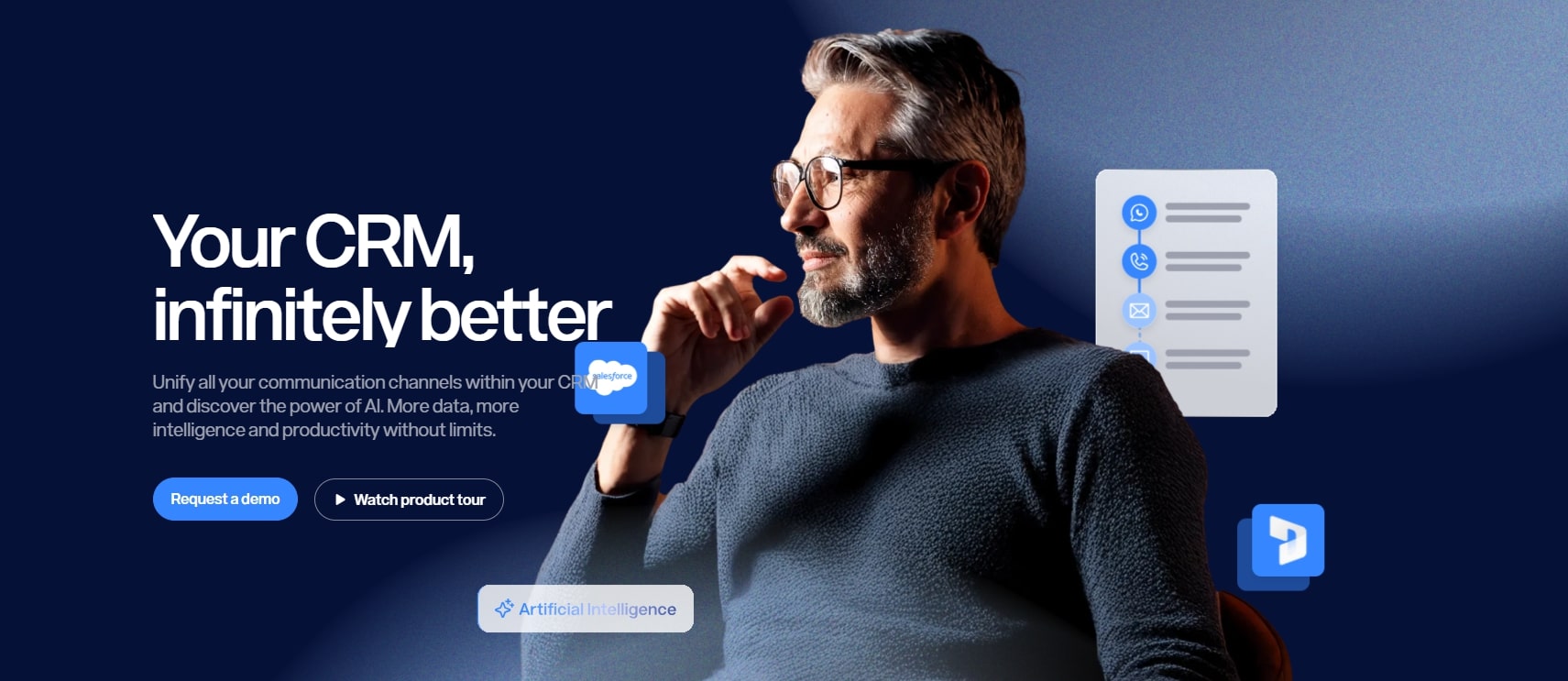
Harmonix AI it's not a CRM with artificial intelligence, but an advanced solution that is installed on top of any existing CRM, like Salesforce, for boost it without replacing it.
This architecture allows it to integrate seamlessly and without the need for large implementation projects.
Unlike other tools, Harmonix digitizes and integrates all communication channels: calls, WhatsApp, email, LinkedIn and video calls.
This creates a complete omnichannel vision, where all the data and conversations remain automatically registered and ready to be analyzed by your AI system.
The true value of Harmonix is in how Turn those interactions into business intelligence.
From generating automatic summaries to detecting hidden opportunities, your artificial intelligence analyzes the context and content of each conversation.
Harmonix AI allows users to work faster and be more productive, thanks to automated tasks, proactive monitoring and intelligent recommendations.
All within the user's usual environment, without changing tools.
5 Key Benefits of Harmonix AI:
- Direct integration with existing CRM (such as Salesforce, SAP, Dynamics, etc.)
- Automatic recording of calls, emails, chats and meetings
- Unified view of all interactions with each contact
- Suggestions for next steps and personalized follow-up emails
- Automation of processes and administrative tasks
Thanks to its focus on CRM and not instead of it, Harmonix transforms existing systems into much smarter and more effective tools.
2. Salesforce + Einstein AI
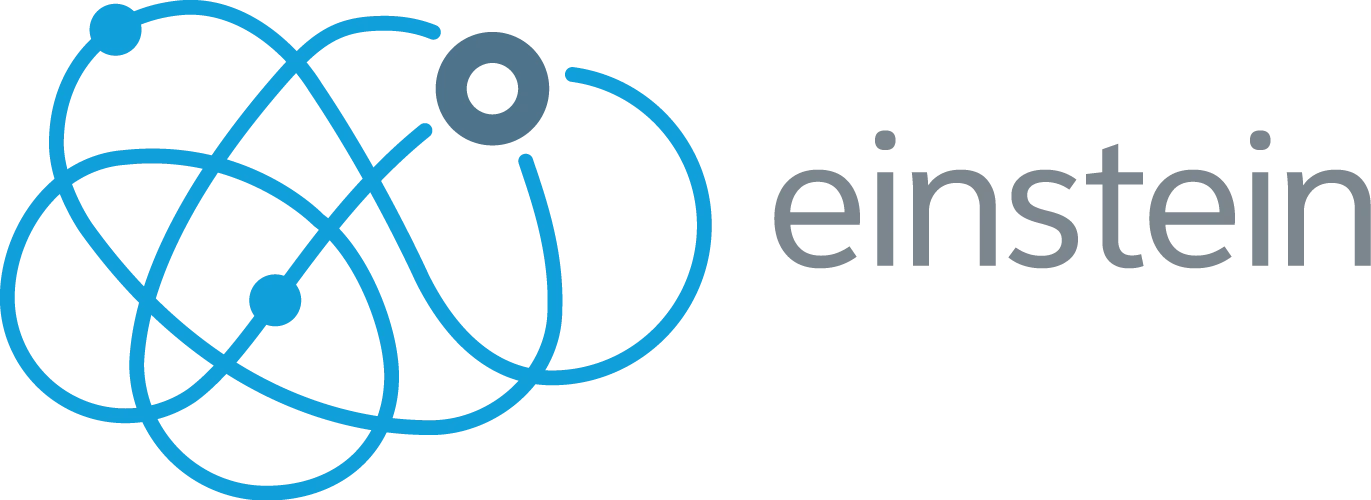
Einstein AI is Salesforce's native artificial intelligence solution.
Predict sales closures, Rate leads and it offers customer behavior analysis.
Its direct integration allows you to automate processes and make decisions without the need for additional tools.
3. Salesforce + Gong

Gong Analyze business calls to identify risks and opportunities in every conversation.
It provides sales coaching based on real data and it integrates with platforms such as Zoom or Microsoft Teams.
It's ideal for teams that prioritize continuous improvement through conversational analysis.
4. Salesforce + Drift

Drift Automate conversations with leads using Smart chat, that Qualify prospectuses in real time.
It integrates with marketing automation tools and is designed to accelerate prospecting from the first contact.
Sync all activity directly with Salesforce.
5. Salesforce + Clari

Clari focuses on the Intelligent forecasting, helping to visualize the sales pipeline in real time.
Automates updates in Salesforce and allows you to detect risks in open opportunities before it's too late.
Its predictive approach makes it a key tool for sales managers.
6. Salesforce + People.ai

People.ai enriches CRM records with accurate data on contacts and business activities.
It offers insights into team performance and helps identify bottlenecks in the sales process.
Its value is in improve the quality of recorded information automatically.
7. Salesforce + Exceed.ai
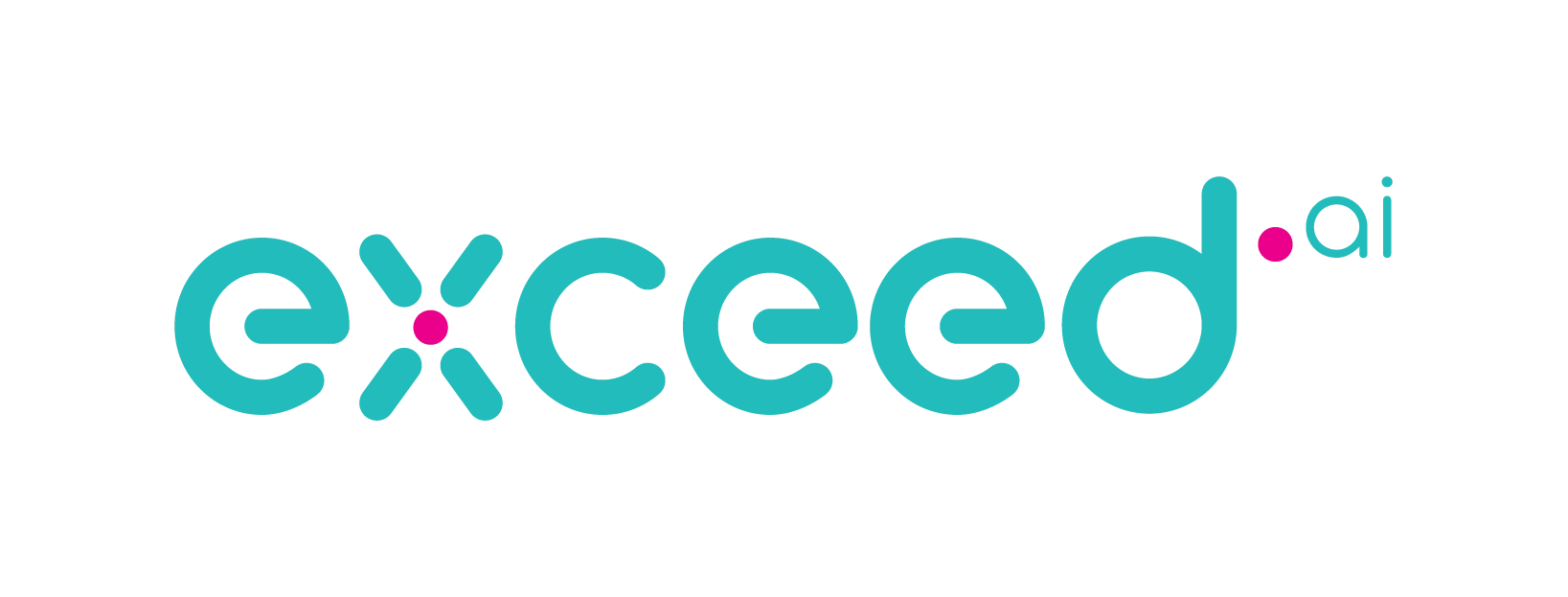
Exceed.ai Act like a virtual assistant Who manages the lead tracking by mail and chat.
Automate first contacts, as well as reminders, improving conversion rates.
All activity is reflected in Salesforce in real time, allowing the team to focus on the hottest leads.
8. Salesforce + Monday Sales CRM with AI
Monday Sales CRM incorporates advanced artificial intelligence features that, when integrated with Salesforce, enable automation of much of the sales cycle and improved team collaboration.
The AI automatically scores and prioritizes leads, integrates visual dashboards with real-time Salesforce data, and generates automatic summaries and reports for sales and management.
It’s an ideal solution for companies seeking full pipeline control and faster, more agile follow-up without losing context.
9. Salesforce + SugarCRM with SugarPredict
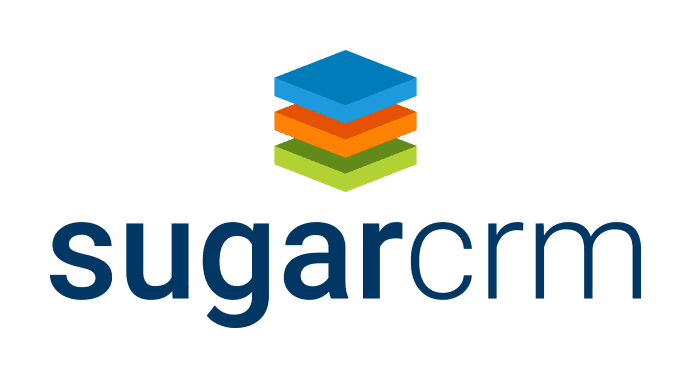
SugarPredict, SugarCRM’s AI engine, brings advanced predictive analytics and intelligent segmentation to Salesforce.
It allows teams to predict the likelihood of closing each opportunity, recommend specific actions to maximize ROI, and synchronize multichannel activity directly in Salesforce.
With its predictive approach, teams can spot hidden opportunities and act before the competition.
10. Salesforce + Nimble CRM with Social AI
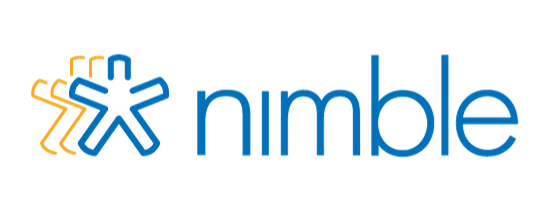
Nimble CRM stands out for combining social and business data in one place. When integrated with Salesforce, it delivers a more complete view of the customer.
It centralizes social media profiles and emails, detects buying signals from online interactions, and suggests key contacts and next steps using AI.
Particularly useful for relationship-based selling and strategic prospecting.
11. Salesforce + Creatio CRM with Studio AI

Creatio CRM features Studio AI, a powerful engine for process automation and data analysis without the need for coding.
The integration with Salesforce enables teams to design optimized sales and marketing workflows, receive personalized recommendations, and synchronize all commercial data in unified processes.
A strong choice for businesses that require total customization and agility in automation.
12. Salesforce + Copper CRM with Smart Suggestions

Copper CRM, known for its deep integration with Google Workspace, adds to Salesforce an intelligence layer focused on relationship management and proactive follow-up.
It suggests emails and follow-up calls based on customer activity, logs interactions automatically, and analyzes communication patterns to improve engagement.
Perfect for teams handling a high volume of interactions and needing to prioritize contacts intelligently.
Power your Salesforce with the help of artificial intelligence
The phrase “CRM-IA for Salesforce” It is gaining prominence because it unites the best of customer management with the predictive and automating power of artificial intelligence.
The result? More productive commercial teams, which they dedicate less time spent on administrative work and more to what really matters: sell and generate value.
In this article, we explore what a CRM-IA is, why it's key to Salesforce, and how solutions such as Harmonix AI are changing the way we work in sales and customer service.
What exactly is a CRM-IA for Salesforce?
A CRM-IA is a solution that incorporates artificial intelligence capabilities directly onto a CRM system, such as Salesforce.
If you're still not sure What is CRM, it's worth reviewing its definition before delving into its AI-powered version.
Its purpose is automate processes, analyze large volumes of data and provide intelligent recommendations that help teams act faster and with better information.
Unlike a traditional CRM, The CRM-IA doesn't just store data, it interprets it and acts on it.
Differences from a traditional CRM
A traditional CRM is limited to recording information: activities, contacts, and opportunities. It all depends on the user.
On the other hand, a CRM-IA automates registrations, generates summaries, prioritizes leads and suggests next steps depending on what happens in each interaction.
In addition, by integrating channels such as calls, emails and WhatsApp, artificial intelligence can work with more context and make better decisions.
Why does Salesforce need artificial intelligence?
Salesforce is a powerful CRM, but without AI it requires the user manually enter most of the data. That takes time and effort.
By adding artificial intelligence, such as that offered by integrated solutions, Salesforce Gets More Proactive, Smarter, and Easier to Use.
The teams work with less friction, More speed and a greater capacity for Detect opportunities on time.
How to improve the productivity and speed of your sales team
A CRM-IA can completely transform the sales team's work pace.
Automation of repetitive tasks: No more wasting time filling out forms. Now, everything is automatically recorded.
Automatic summaries of calls and meetings: Before each contact, the team has all the context in seconds.
Intelligent tracking: AI detects what was said, with whom and when, and proposes personalized actions for each case.
3 Challenges When Integrating a CRM-IA with Salesforce (and How to Overcome Them)
1. Resistance to change in the team
It's normal to be reluctant to use a new tool. The key is to show real benefits from day one: fewer tasks, more sales.
2. Integration with existing tools
A good solution should work on Salesforce, without replacing it or breaking current flows.
Harmonix, for example, is installed about any CRM and adapts to the environment already in use, without complications or compromising the data protection.
3. Initial training to get the most out of it
A CRM-IA is only as useful as its intended use. That's why agile training, based on real examples and practical use, is important.
In addition, when AI makes life easier for the user, the learning curve is reduced to a minimum.
6 benefits of integrating AI into your CRM
Artificial intelligence isn't just here to automate tasks. When integrated with a CRM, expands the team's ability to sell better, faster and with greater accuracy.
Here are some of the most notable benefits of incorporating AI into your customer relationship management system:
1. Save time on repetitive tasks
One of the biggest impacts of AI is the automation of administrative tasks.
Actions such as recording calls, writing notes or creating follow-ups no longer depend on the user.
This frees up working hours that can focus on closing sales or better serving customers.
2. Greater personalization in interactions
AI analyzes the complete history of each contact and allows adapt messages and proposals to the real context of each client.
This improves conversion rates and makes every interaction more relevant.
3. Smarter decisions with more data
Traditionally, many companies manage their customer relationships from a Single channel, such as the mail or the telephone.
With tools such as Harmonix, is it possible integrate multiple channels (WhatsApp, calls, email, LinkedIn...) and centralize all the information.
This allows us to make better informed strategic decisions., based on real and complete data.
4. Increased team productivity
With the help of AI, users Reduce downtime and they eliminate tasks than before
they did it manually.
Harmonix AI, for example, allows you to automatically record all business activity and suggest next steps, which makes teams work faster and more effectively.
5. Proactive and no-forget monitoring
AI can detect which leads are active, which ones need follow-up, or which opportunities are at risk.
Thus, the CRM ceases to be a simple file and becomes a tool proactive that helps not to miss opportunities.
6. Easy adoption without the need to switch to CRM
One of the most common barriers to implementing technological improvements is the fear of having to change systems.
Harmonix is installed on top of any existing CRM, such as Salesforce or Dynamics, and enriches it without replacing it.
This makes adoption much easier and results come quickly, without friction.
Integrating AI into your CRM isn't just a technical improvement.
It is a direct form of boost team efficiency, improve customer experience and generate more business in less time.
Real-World Applications and Advanced Strategies for AI-CRM in Salesforce
Integrating artificial intelligence into Salesforce goes far beyond automation and reporting.
When implemented strategically, an AI-powered CRM becomes a revenue accelerator and a decision-making engine that transforms both customer experience and internal workflows.
Below, we explore advanced strategies, real-world scenarios, and actionable tips to get the most out of AI within Salesforce.
1. Turning Every Interaction Into Actionable Insights
One of the most valuable aspects of AI in Salesforce is the ability to transform raw conversations into structured intelligence.
For example:
- After a sales call, the AI automatically transcribes the conversation, tags key topics, and identifies objections or buying signals.
- In a support chat, it detects recurring issues and recommends updates to FAQs or knowledge bases.
This information is pushed directly into Salesforce records so managers can spot patterns across teams, products, or customer segments.
Why it matters:
Without AI, valuable information is often trapped in email threads or call recordings that no one reviews. With AI, every single exchange is turned into data that drives smarter decisions.
2. AI-Driven Lead Scoring and Prioritization
Traditional lead scoring in Salesforce relies on predefined rules (e.g., opened three emails, visited the pricing page twice).
AI-driven scoring goes a step further by learning from historical wins and losses to determine which leads are most likely to convert.
Key capabilities include:
- Prioritizing leads not just by activity, but by intent and behavioral patterns.
- Detecting high-potential prospects even if they haven't followed the “classic” buyer journey.
- Continuously adapting scoring models based on new data.
Impact:
Sales reps focus their time on the 20% of leads that drive 80% of revenue, significantly improving conversion rates.
3. Predictive Sales Forecasting With Real Context
Sales forecasts are often inaccurate because they rely on self-reported data from reps, which may be outdated or incomplete.
AI in Salesforce analyzes:
- Deal activity frequency and quality.
- Communication tone and sentiment.
- External market indicators (e.g., industry trends, seasonality).
The result is a dynamic, real-time forecast that updates automatically, helping leadership spot risks or opportunities before they become urgent.
4. Proactive Churn Prevention
AI’s predictive capabilities aren’t limited to sales — they also play a key role in customer retention.
By monitoring:
- Drop-offs in product usage.
- Negative sentiment in support tickets or calls.
- Late or missed payments.
… the system can alert account managers when a customer is at risk of leaving, triggering pre-defined retention workflows in Salesforce (discount offers, personal check-ins, or training sessions).
Bottom line:
Retention campaigns become targeted and timely, instead of reactive and generic.
5. Intelligent Omnichannel Management
In many companies, Salesforce acts as the central hub for customer information, but channels like WhatsApp, LinkedIn, or video calls are still handled separately.
An AI-powered integration like Harmonix AI enables:
- Unified inboxes where all messages are visible alongside customer records.
- Context-rich notifications — e.g., if a key prospect replies on LinkedIn, the AI can suggest an immediate call or a tailored follow-up email.
- Automatic synchronization so no conversation is ever lost or duplicated.
Result:
Teams engage customers seamlessly across all channels, maintaining context and consistency.
6. AI Coaching and Performance Optimization
Beyond helping customers, AI can coach your sales and support teams in real time.
Some examples:
- During a live call, the AI suggests better phrasing or reminds the rep to ask key qualifying questions.
- After a meeting, it provides a scorecard with strengths, weaknesses, and specific improvement tips.
- Managers can access aggregated performance analytics to design targeted training sessions.
Why it works:
It’s like having a sales trainer in every interaction — without slowing the conversation or distracting the rep.
7. Workflow Automation at Scale
Repetitive workflows eat up valuable selling time. AI eliminates this by:
- Automatically creating follow-up tasks after calls.
- Updating opportunity stages when certain conditions are met.
- Triggering nurture sequences when a prospect shows renewed interest.
When combined with Salesforce’s own automation features (Flows, Process Builder, etc.), AI ensures that every next step happens instantly and without manual effort.
8. Hyper-Personalized Customer Journeys
Generic drip campaigns no longer cut it. Customers expect communication that feels tailor-made.
AI enables Salesforce to:
- Adjust email and content delivery based on user engagement.
- Recommend cross-sell or upsell offers tied to recent purchases or interactions.
- Create micro-segments that human marketers wouldn’t spot — like customers who respond well to video messages sent on Tuesdays.
Effect:
Higher engagement, better conversion rates, and stronger brand loyalty.
9. Case Study: From Manual Chaos to AI-Powered Clarity
The Challenge:
A mid-sized B2B tech company used Salesforce for lead tracking but relied on manual note-taking, inconsistent follow-ups, and siloed communication channels.
The AI Solution:
They implemented Harmonix AI on top of Salesforce to unify calls, WhatsApp, LinkedIn, and email in one view. The AI logged every interaction, scored leads in real time, and generated personalized follow-up suggestions.
The Results in 90 Days:
- 42% faster average response time.
- 27% increase in closed deals.
- Managers reported full visibility into team activity for the first time.
10. Scaling Without Losing the Human Touch
One concern with automation is losing the personal connection.
However, when used correctly, AI amplifies human effort instead of replacing it.
For example:
- AI handles repetitive data entry and basic queries.
- Reps spend more time building relationships, solving complex problems, and closing deals.
The combination of speed + personalization is what drives measurable ROI.
11. Measuring the ROI of AI in Salesforce
To justify investment, it’s critical to track both direct and indirect benefits:
Direct:
- Increase in conversion rate.
- Shorter sales cycle.
- Higher retention rates.
Indirect:
- More consistent customer experience.
- Reduced employee burnout.
- Faster onboarding for new reps.
Pro Tip: Set benchmarks before implementing AI so you can clearly measure its impact within 30, 60, and 90 days.
12. Future-Proofing Your CRM Strategy
AI in Salesforce is evolving rapidly, with innovations like:
- Generative AI drafting proposals, contracts, and even sales scripts.
- Voice AI that understands tone and emotion during calls.
- Predictive service smart routing that assigns cases to the best-suited agent automatically.
Companies that start integrating these capabilities now will be well ahead of competitors still relying on manual processes.
Why Harmonix AI can be your best ally
Most commercial teams wastes time jumping between tools, collecting scattered information and recording data manually.
Harmonix AI eliminates that friction by automating key tasks and centralizing everything in a single space.
Unlike other systems, Harmonix It doesn't replace your current CRM, but It is installed on top of it, boosting its operation without the need to change the environment.
In addition, digitize all communication channels (calls, WhatsApp, email, LinkedIn...) and connects them with artificial intelligence to offer accurate analysis, automated monitoring and decisions based on real context.
This translates into faster and more productive users, fewer repetitive tasks and more time to focus on what's important: selling.
If your company manages a large volume of calls, consider also integrating a call center software such as Harmonix to centralize care and improve operational efficiency from the first contact.
Frequently Asked Questions (FAQs)
How does Harmonix AI help with sales analysis?
Analyze conversations, interactions and results, offering automatic summaries, pipeline insights and forecasts based on real data.
This makes it possible to make more informed decisions and detect opportunities in advance, reinforcing the sales analysis in an automated and contextual way.
Can I use Harmonix to improve customer prospecting?
Yes. AI identifies opportunities, suggests next steps and Automate follow-ups, facilitating prospecting with more context and better timing.
In addition, it reduces the operational burden so that the sales team can focus on closing more sales. You can check out more ways to improve customer prospecting with the help of AI.
Is Harmonix compliant with GDPR and data protection?
Harmonix complies with the General Regulations of GDPR data protection.
The platform ensures that all information processed is secure, controlled and used responsibly.
Can Harmonix be integrated with my current Salesforce without losing data?
Of course. Harmonix is installed on top of your existing CRM, like Salesforce, without deleting information or altering your current system.
This makes it a practical, scalable and easy to adopt solution.
Does Harmonix work from the mobile phone or only from the computer?
It works from both. You can manage your CRM from your mobile, Report by voice and access tasks, summaries or communications in real time.
Ideal for teams that work on the move or in a hybrid way.


